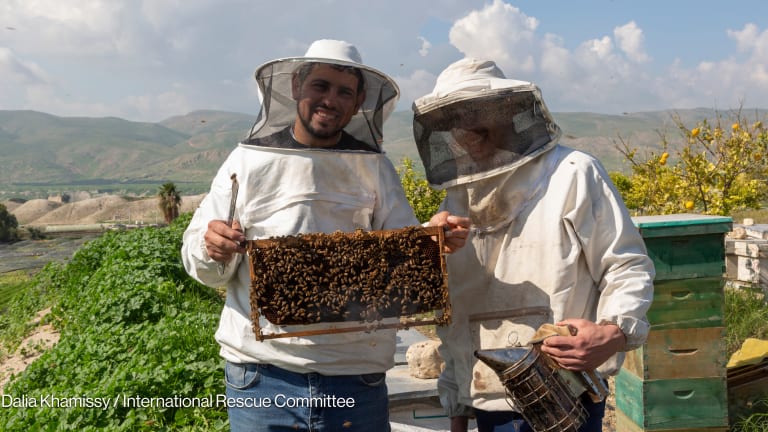
An average of 2,000 people cross the Syria-Jordan border every day and become refugees. But not all of them live in camps.
Mike Bailey from World Vision has been working now for several months in Jordan, where he is helping build water and sanitation facilities for a new refugee camp being set up in the country.
Putting in seven miles of piping and digging in 2,600 septic tanks is no easy task, but this is not what Bailey said are the biggest challenges for aid workers assisting people affected by the crisis.
“The biggest challenge is the way the crisis is growing so quickly” and ensuring support for the host communities, the emergency communications manager told Devex.
About 40 percent of Syrian refugees live in camps in Jordan, while the rest stay with host communities, many of which are already stretched thin.
On World Refugee Day, Bailey shares details about the new refugee camp, the challenges aid workers are facing on the ground and what donors can do to better respond to the crisis.
World Vision is helping build a new camp in Jordan. How is the project progressing?
Refugees from Syria have been entering Jordan since 2011. Numbers crossing the border rose dramatically at the end of 2012 and have continued to rise in 2013 to a level of 2,000 a day on average. At the beginning of June 2013 there are nearly 500,000 Syrians registered with UNHCR as refugees or awaiting registration and many more people who remain unregistered.
The Jordanian government recently began work with the United Nations to create a new camp called Azraq and help ease the pressure on other, already overcrowded locations. World Vision is helping with the water and sanitation for a portion of this newest camp. By the end of the year, U.N. agencies expect Azraq to be home to roughly 130,000 refugees. If those numbers are reached, Azraq will be the largest refugee camp in Jordan and the country’s fifth largest population center, all on a bare desert stretch 12 miles from the nearest town and an hour and a half drive from Amman.
As you can imagine, it’s a very challenging job for our staff and for the many other agencies working to make an inhospitable and remote stretch of desert home for the refugees expected to arrive within the next few months. Our staff are currently racing to put in 7 miles of piping and dig in 2,600 septic tanks, each the size of a small car. These large septic tanks have to be delivered nearly 50 miles over bumpy roads.
Once finished, the pipes will deliver more than two Olympic-sized swimming pools worth of water every week to 31,000 refugees. This amounts to approximately seven gallons per person, per day for personal hygiene, drinking and washing, all in the searing desert heat.
How long have you been working on the crisis? Did you think it would last this long?
I have been helping in the crisis for more than a year, and working in Jordan specifically for several months. It’s always hard to predict the future of such a complex crisis, especially given its scale and the number of people and countries involved. World Refugee Day reminds everyone that these people are fleeing from violence, leaving their homes and their land, their jobs and their schools. More than a million and a half people have already crossed out of Syria into neighboring countries. It is predicted that this number will double in the coming five months. Half of them are children and they all need protection, water, shelter, food, and health services. They will all need ways to attend school because their education cannot wait until they can go home again. We have no idea when that will be.
Apart from dwindling funds, what’s the other biggest challenge for aid workers assisting refugees affected by the Syrian crisis?
The biggest challenge is the way the crisis is growing so quickly, with so many people displaced and in need. Another big challenge is that we want to make sure we support the host communities who are seeing this huge influx of people come into areas that often already have resources stretched thin. As I mentioned, at least 60 percent of refugees in Jordan are living in the community and not in camps, in Lebanon nearly all of the refugees are living with host communities. So we must ensure we are helping not just those fleeing the conflict, but also the communities who are taking in large numbers of displaced people. Given the difficult, often changing circumstances in Syria and refugee-hosting countries we hope to see donors better coordinate between themselves to minimize differences in what is required of partners, and respond flexibly to the situation on the ground, so partners can respond as efficiently and effectively as possible.
Read our last 3 Questions.


